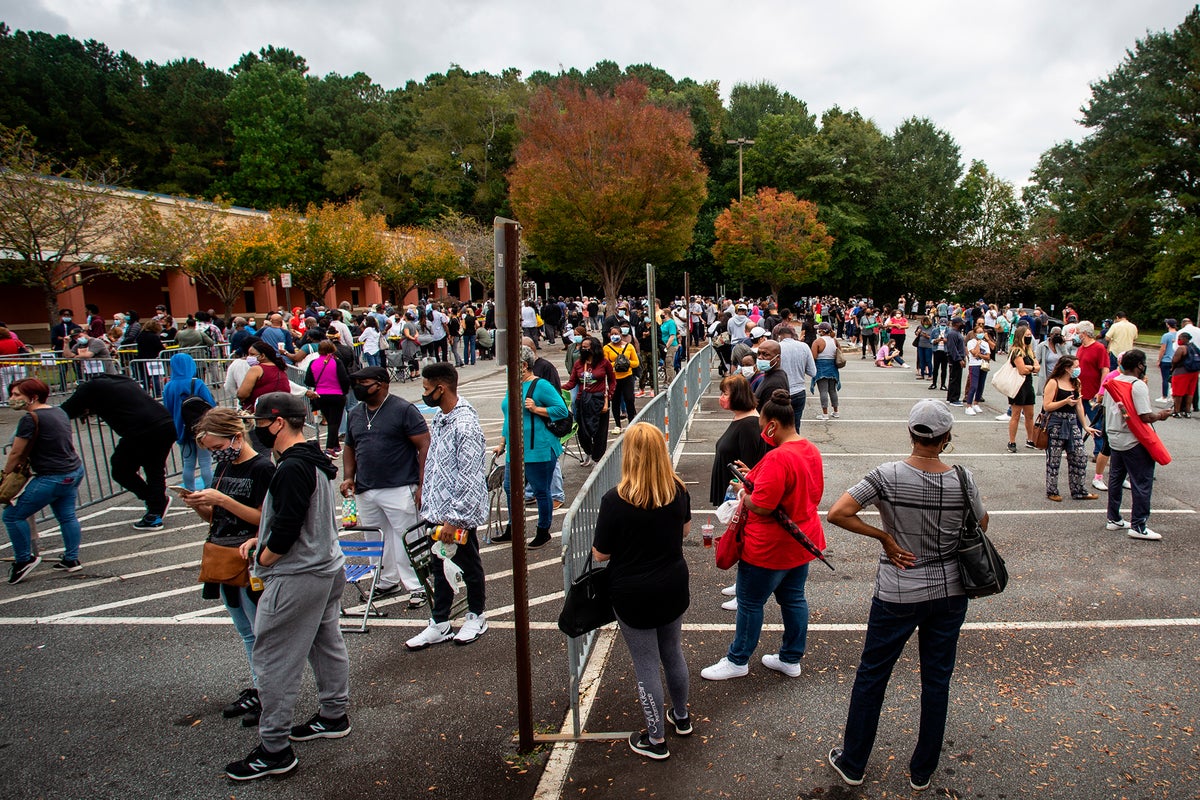
A federal judge has upheld Georgia’s ban on people handing out food and water to voters waiting in line to cast their ballots at the polls, part of a sweeping election law that has faced widespread criticism and a series of legal challenges.
US District Judge JP Boulee denied a request for a preliminary injunction from a coalition of voting rights groups who challenged the recently enacted ban on so-called “line relief” measures that makes it a crime to give out food or water within 150 feet of a polling place or within 25 feet of a person standing in line to vote.
Opponents argue that the measure is an attempt to suppress votes in areas where voters are more likely to endure longer lines on Election Day.
The judge argued that the law does not prohibit groups from verbally encouraging voters to stay in line or helping elderly or disabled voters.
But Judge Boulee suggested that banning food and drink within 25 feet of any voter standing in lines is likely unconstitutional, given reports of hours-long lines that have formed in some precincts disproportionately impacting Black voters.
He said it was too close to November’s general election to overturn it, potentially causing chaos and confusion among poll workers and election administrators in the coming weeks.
Voting rights groups said they are disappointed with the judge’s decision but expressed some hope that the law could be revisited ahead of future elections.
“It’s unfathomable that anti-voter politicians can continue the cruel practice of preventing Georgians from giving bottles of waters to their neighbors waiting in long polling lines on hot days, especially if those neighbors are elderly, have disabilities, or have other conditions that make it hard to wait in long lines,” Southern Poverty Law Center senior staff attorney Poy Winichakul said in a statement.
Plaintiffs included civil rights groups the New Georgia Project, the NAACP and Asian Americans Advancing Justice Atlanta, as well as faith organisations Concerned Black Clergy and the Sixth District of the AME Church, among others.
Student-run groups, members of the Delta Sigma Theta Sorority and voter advocates also submitted court filings detailing their work helping people in line, from filling up coolers with cold waters and handing them out to offering umbrellas and phone chargers – activities that are now illegal.
The US Department of Justice has also filed a separate challenge to strike down the law, which Attorney General Merrick Garland alleges was drafted with “the purpose of denying or abridging the right of Black Georgians to vote on account of their race or colour, in violation ... of the Voting Rights Act.”
John Cusik, a senior staff attorney with the NAACP Legal Defense Fund, pointed out the absurdity of the judge recognising in his decision that many voters are forced to wait in long lines to cast their ballots without there being any legal relief from others.
“So too is a criminal ban on the ability of organizations like the Deltas to provide food or water to voters waiting in those lines to express their support for their dignity and right of voters to participate,” he said in a statement.
The ban “particularly impacts Black voters who are disproportionately more likely to endure unbearably long wait times at their polling sites across Georgia,” he said.
The Independent has requested comment from the offices of Governor Brian Kemp and Secretary of State Brad Raffensperger.







